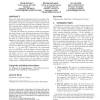31 search results - page 3 / 7 » Approximability of Combinatorial Problems with Multi-agent S... |
ICML
2010
IEEE
13 years 8 months ago
2010
IEEE
We develop an efficient learning framework to construct signal dictionaries for sparse representation by selecting the dictionary columns from multiple candidate bases. By sparse,...
AMAI
2004
Springer
14 years 12 days ago
2004
Springer
This paper extends the framework of partially observable Markov decision processes (POMDPs) to multi-agent settings by incorporating the notion of agent models into the state spac...
SIGECOM
2008
ACM
13 years 7 months ago
2008
ACM
We provide tight information-theoretic lower bounds for the welfare maximization problem in combinatorial auctions. In this problem, the goal is to partition m items among k bidde...
FOCS
2006
IEEE
14 years 1 months ago
2006
IEEE
Combinatorial allocation problems require allocating items to players in a way that maximizes the total utility. Two such problems received attention recently, and were addressed ...
CORR
2011
Springer
13 years 2 months ago
2011
Springer
In Combinatorial Public Projects, there is a set of projects that may be undertaken, and a set of selfinterested players with a stake in the set of projects chosen. A public plann...

